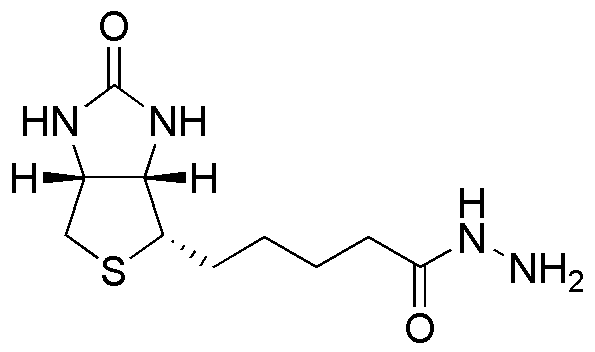(+)-Biotin hydrazide is widely utilized in research focused on
- Bioconjugation: This compound is commonly used in bioconjugation techniques to label proteins and peptides, enhancing their detection and study in various assays.
- Drug Development: It plays a significant role in drug formulation, particularly in the development of targeted therapies, where it helps in delivering drugs to specific cells.
- Diagnostics: In clinical diagnostics, it is used as a component in assays to improve the sensitivity and specificity of detection methods, such as ELISA.
- Research in Metabolism: Researchers utilize it to study metabolic pathways involving biotin, providing insights into nutritional biochemistry and potential deficiencies.
- Cell Culture Applications: It is beneficial in cell culture media formulations, promoting cell growth and viability, particularly in studies involving biotin-dependent enzymes.
General Information
Properties
Safety and Regulations
Applications
(+)-Biotin hydrazide is widely utilized in research focused on
- Bioconjugation: This compound is commonly used in bioconjugation techniques to label proteins and peptides, enhancing their detection and study in various assays.
- Drug Development: It plays a significant role in drug formulation, particularly in the development of targeted therapies, where it helps in delivering drugs to specific cells.
- Diagnostics: In clinical diagnostics, it is used as a component in assays to improve the sensitivity and specificity of detection methods, such as ELISA.
- Research in Metabolism: Researchers utilize it to study metabolic pathways involving biotin, providing insights into nutritional biochemistry and potential deficiencies.
- Cell Culture Applications: It is beneficial in cell culture media formulations, promoting cell growth and viability, particularly in studies involving biotin-dependent enzymes.
Documents
Safety Data Sheets (SDS)
The SDS provides comprehensive safety information on handling, storage, and disposal of the product.
Product Specification (PS)
The PS provides a comprehensive breakdown of the product’s properties, including chemical composition, physical state, purity, and storage requirements. It also details acceptable quality ranges and the product's intended applications.
Certificates of Analysis (COA)
Search for Certificates of Analysis (COA) by entering the products Lot Number. Lot and Batch Numbers can be found on a product’s label following the words ‘Lot’ or ‘Batch’.
*Catalog Number
*Lot Number
Certificates Of Origin (COO)
This COO confirms the country where the product was manufactured, and also details the materials and components used in it and whether it is derived from natural, synthetic, or other specific sources. This certificate may be required for customs, trade, and regulatory compliance.
*Catalog Number
*Lot Number
Safety Data Sheets (SDS)
The SDS provides comprehensive safety information on handling, storage, and disposal of the product.
DownloadProduct Specification (PS)
The PS provides a comprehensive breakdown of the product’s properties, including chemical composition, physical state, purity, and storage requirements. It also details acceptable quality ranges and the product's intended applications.
DownloadCertificates of Analysis (COA)
Search for Certificates of Analysis (COA) by entering the products Lot Number. Lot and Batch Numbers can be found on a product’s label following the words ‘Lot’ or ‘Batch’.
*Catalog Number
*Lot Number
Certificates Of Origin (COO)
This COO confirms the country where the product was manufactured, and also details the materials and components used in it and whether it is derived from natural, synthetic, or other specific sources. This certificate may be required for customs, trade, and regulatory compliance.


